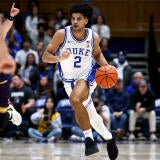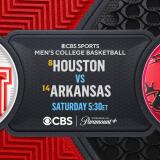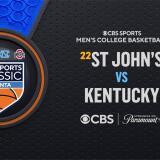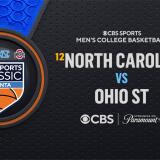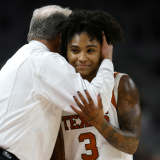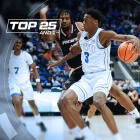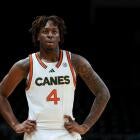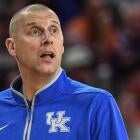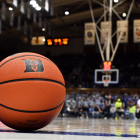As war escalates half a world away, Ukrainian college basketball players share their shock, pride and fears
From Maryland to Utah State, Fordham to San Francisco and beyond, college basketball players reveal what it's been like for their families at home in Ukraine
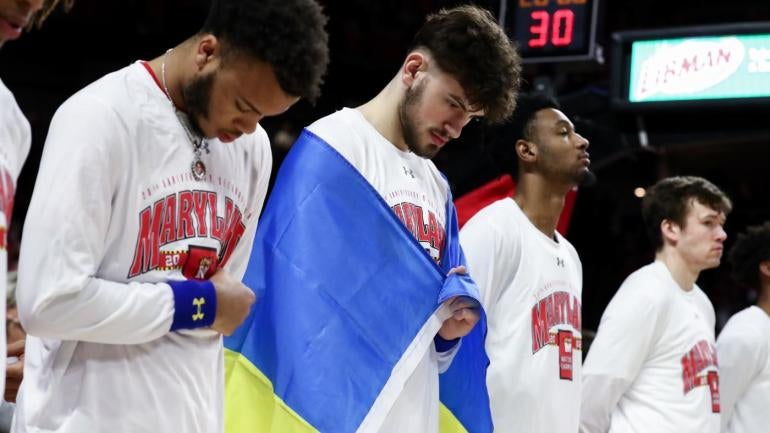
Tulsa's Nikita Konstantynovskyi knew something was up when he was pulled aside during warmups before the Golden Hurricane's game at SMU on Wednesday. Someone wanted to talk to him.
It was the former President of the United States.
George W. Bush, who frequently attends SMU games, endeavored through bad weather to watch a little basketball. But first, he wanted to express his support for Ukraine, directly, to Tulsa's 6-foot-10, 21-year-old backup center.
"I knew his face but I still couldn't believe what was happening at first," Konstantynovskyi told CBS Sports.
How Bush came to learn the visiting team had a Ukrainian on the roster is still a mystery to everyone in Tulsa's program, but that's what traveling with a Secret Service detail will get you.
Before that game, Russia's invasion was viewed as inevitable. By the time the game was over, the first shots in Ukraine had been fired. Konstantynovskyi's family, who listens to his games in the middle of the night on the internet, has been giving him updates via FaceTime multiple times per day. The morning after the game vs. SMU, he called his parents.
"Through the phone I could hear the bombs," he said. "My mother got quiet and my heartbeat just stopped. It was so painful to hear my mother being concerned about what was going to happen tomorrow."
His family lives in the capital city of Kyiv. At first it was the airports and military bases under attack. Konstantynovskyi knew that was only the beginning. His family is OK. For now. But every day is drenched in worry.
"I'm talking to you right now and I'm pretty sure they're getting bombed," he said Sunday night.
As Russia's war on Ukraine has dominated the news across the planet for nearly a week, a handful of men's college basketball players from around the United States have helplessly scrolled their phones, FaceTimed family members and/or texted with friends over secure messaging apps halfway across the world as they've tried to remain calm.
There are seven Ukrainian Division I men's basketball players. Konstantynovskyi at Tulsa, in addition Maryland's Pavlo Dziuba, Utah State's Max Shulga and Fordham's Rostyslav Novitskyi all call Kyiv home. Canisius' George Maslennikov hails from Odessa, a beautiful southwestern port city on the Black Sea. San Francisco's Volodymyr Markovetskyy's family is from the luscious mountainous region and lives in the city of Ivano-Frankivsk, a gateway to the best skiing Ukraine has to offer. It's a city of 350,000 and considered one of the nicest places in the country to raise a family. Grand Canyon's Dima Zdor is from Yalta, one of the southernmost cities and technically in Crimea, an area that's been controlled by Russia since 2014.
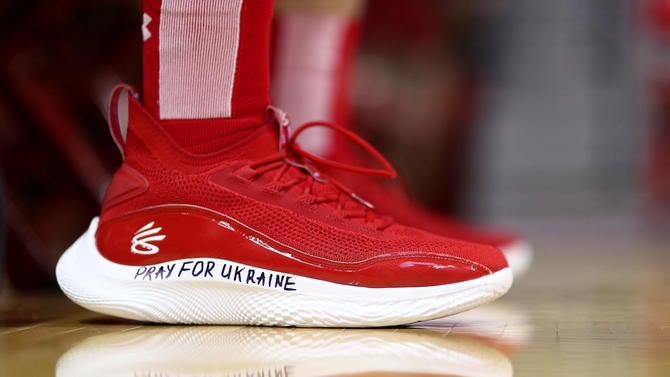
Ukrainians are tough, smart, vigorous. Almost everyone grows up learning to speak at least two languages. The players I spoke to are fluent in at least four. Ukraine is the second largest nation by size (bordered by seven countries) and eighth-largest by population (44 million) in Europe. Ukrainians are a people, as the world has come to know in recent days, with a deathly fierce pride in their heritage and houses. World-champion boxers have taken up arms, as has Ukraine President Volodymyr Zelensky, who has become a global icon for refusing to blink despite Russian president Vladimir Putin's threats.
"I'm very proud of my president because I saw he's fighting from Ukraine, for Ukraine," San Francisco's Markovetskyy told CBS Sports. "It's Ukrainian nature to fight for freedom because we fight from our home. Everything we do, we just protect our house. We don't attack. I saw my president do this and I'm really proud of what he did in the situation at this time. For me, everybody in Ukraine is a hero. The way they protect our house is incredible. They're all heroes."
As a conflict with global repercussions has ensnared the world's attention, these players have done their best to stay level and feed off the support and positivity from their teammates, coaches and communities. But it's been emotionally and mentally taxing. The mornings come and they are waking up — if they even fell asleep to begin with — to hundreds of messages from friends and family around the country, giving them avalanches of updates.
"The past four days it's been really hard to sleep," Maryland's Dziuba told CBS Sports. "Scrolling through the news and seeing videos of people dying, and it's super scary. I can imagine if it was my parents or friends. It's super hard."
Dziuba was draped in the Ukrainian flag before and after Maryland's biggest win of the season on Sunday, a convincing victory over No. 22 Ohio State. For the second straight game he had messages of support for Ukraine, writing PEACE, NO WAR and FAMILY on his shoes.
Dziuba's mother, father and older brother are still in Ukraine, his parents having fled Kyiv in recent days. Dziuba shared their locations with CBS Sports, but asked they not be made public for fear of their safety. His mother slipped on ice a month ago and broke her leg. She hears the bombs in the distance as she waits and tries to heal in a place that, hopefully, is secluded from Russian soldiers, let alone missile strikes.
"I'm literally talking to them every single day, five to 10 times a day," he said.
Despite the eight-year Donbas War, Dziuba said his family always felt safe in Kyiv. It was never supposed to come to this. To hear Dziuba and Konstantynovskyi, it's as if they grew up together. Kyiv is a city of more than 2.8 million, but its people share an ethos — a spirit so strong, the world is seeing it on display as the country shows it's willing to fight to the death to maintain its democracy.
"I can't believe this is happening in my hometown, where I walked on the street with my friends and relatives, walked to school when it was peaceful," Konstantynovskyi said. "And now there's tanks, fire everywhere. People can't walk outside. Tomorrow is not promised. That's what I started understanding."
Many of the players use an app called Telegram for group texts and group phone calls. On Tuesday, Konstantynovskyi was sent a video of the basketball gym he grew up playing in being destroyed. It's the same gym Fordham's Rostyslav Novitskyi learned to play. They are best friends. Now the palaces of their childhood are being obliterated.
"They were bombing TV and radio stations and national channels area," he said. "And my basketball gym's located right next to it."
Dziuba has a friend whose father is in the Ukrainian military and provides updates to his son every day. Monday morning into Tuesday was expected to be the hardest overnight yet. The Russians have met viable resistance from Ukraine to this point, meaning a rain of rockets could land in Kyiv to further the battalions' advancements in the coming hours or days.
"Mostly all of the cities are beautiful, and I don't know what it's going to be like after the war," Dziuba told me. "Everything's going to be in ruins."
Like every player I spoke with, San Francisco's Markovetskyy never thought there would be war of this magnitude in his country. When his coaches began asking him last week what was happening in Ukraine, he believed it was an exaggerated concern. Russia has been an aggressor against Ukraine for years. Would this really be different? After Markovetskyy finished basketball practice it was close to 6 a.m. in his home city of Ivano-Frankivsk, and when Markovetskyy checked Facebook he noticed his mother was online. At that hour? Not normal. He was instantly nervous. He called her, put on airs of positivity, but his mother started crying immediately. Their country was indeed under attack, and it had only just begun.
"There's no way the war can affect my city," Markovetskyy said. "No way, it can't happen. And I was wrong."
Within 90 minutes of his first call to his mother, the airport 10 minutes from their house was bombed.
"The coaching staff, the players, the USF community, they've supported me," Markovetskyy said. "Maybe, if they don't do this, mentally, I would be destroyed."
Markovetskyy's father is a soldier in this war. His everyday job is to train police officers. He is an expert in shooting tactics and physical safety protocol. Now, each morning he wakes up, grabs his AK-47 and goes on patrol for 10-plus hours.
Markovetskyy's mother and sister, by chance and minor miracle, made it out of the country, into Lithuania, over the weekend after waiting more than 15 hours in a car in a 10-mile-long line to the border Poland-Ukraine border. They had to abandon their car and walk for miles in near-freezing temperatures to get closer to make passage into Poland. Because Markovetskyy's mother is a nurse and the family has connections to Ukrainian police and the army, they made arrangements to leave, but only got across thanks to someone who agreed to drive them to the front of the line, someone with access to cross into Poland. A friend of Markovetskyy's was there, waiting to take them to Lithuania. Yet his mother could be called back to help in the war and be a nurse at any point. If that happens, his sister might come to the United States to join her brother.
"She's a hero," Markovetskyy said of his mother. "It's the night, it's cold, they're hungry and she almost gave up."
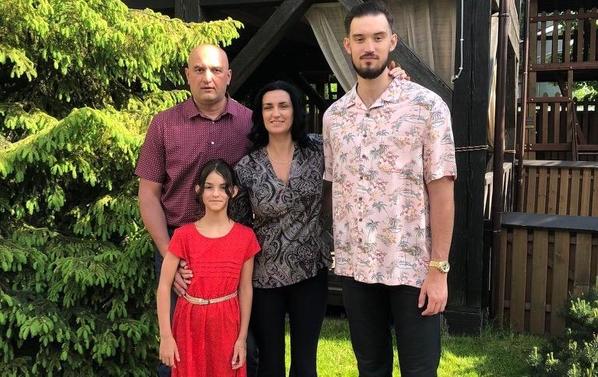
Markovetskyy expressed his unending thanks to everyone who has sent messages from Ukraine, to all who have helped his family. But he's adamant on this point: "This situation happening right now, we need help. Ukraine is a strong country, our soldiers are strong, but we need help. I know a lot of people pray for Ukraine and I know a lot of people have donated money, but the politicians started this and only they can finish this."
How does one go to classes, do homework, play basketball, when your family and friends are currently living in one of the most dangerous places on the planet?
"I'm ready for any moment to fight for Ukraine," Markovetskyy said. "For my mom, for my father, for my people. I'm ready to fight for Ukraine. At any time."
Utah State's Max Shulga is the same way. He's got that Ukrainian gusto. He doesn't want to be in the United States right now. He wants to be where the danger is.
"I'm very, very, very proud to be Ukrainian and very proud of the army and the job they've done in the past couple of days," Shulga told CBS Sports. "I always knew we were a tough nation and would never give up our land for free and would always fight back. There is no doubt in my mind that we'll fight and we will beat them. It also hurts that I'm so far away and I can't do anything. Even if it's more dangerous, I'd rather be with my family, and going through it all together would make me more calm."
When Shulga checked into Utah State's final home game on Saturday, the student section had their tribute ready: blue and yellow pieces of paper they held up to replicate the Ukrainian flag.
"I would've never believed it, even my parents, my friends didn't believe it. It doesn't feel real, honestly," Shulga said. "It feels like a video game. I thought we grew out of declaring war and stuff like that. I thought that was in the past."
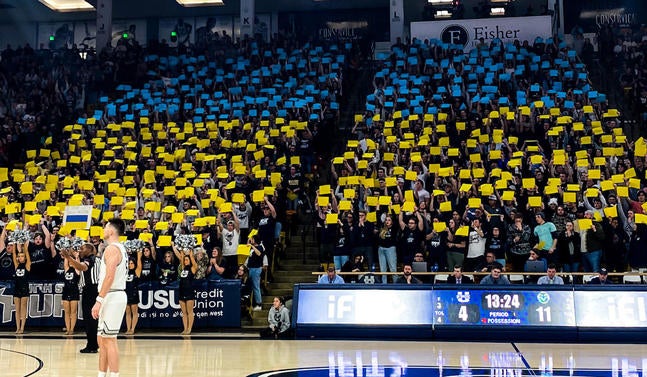
Shulga is 19. This is his second year in the United States. He grew up with basketball as his life. His mother played as a younger woman and his father is a former basketball referee. Shulga grew up playing against other small basketball clubs in Kyiv, sometimes taking the subway or bus to play. Those same subway stations are now being used as bomb shelters. It's what Konstantynovskyi's family — who lives 20 minutes west of the capital — has endured daily as well. They are a seven-minute walk from an underground station that they constantly scurry to for shelter. They can't drive there; the roads have been destroyed. They judge whether or not to go to it based on how close and how loud the air raid sirens are.
"Can you imagine waking up at 3 a.m. in the morning from the sirens and to be scared to walk seven minutes to the underground?" Konstantynovskyi said.
As for Shulga, he speaks of his mother's day-to-day existence as though her past is a former life that won't be coming back.
"She used to work at a beauty salon," he said.
Past tense. There is no more work. There may not be any more beauty salon. His parents and 14-year-old sister are trapped in their apartment in Kyiv. One of Shulga's cousins tried for 48 hours to leave Ukraine, only to give up amid the mass of humanity looking to do the same.
"I'm really worried on a daily basis," Shulga said. "I try to stay in touch and they're doing a good job of calming me down and saying everything is going to be alright."
When the sirens go off around Kyiv, Shulga's family goes into the hallway on the fourth floor of their 16-story apartment building on the south side of the city to try and protect themselves from any attacks that could permanently destroy their home.
Konstantynovskyi has received video messages from his father that show burned tanks and brutal scenes around Kyiv. He takes them as the family makes their way to the shelter. There have been times when his dad, who always picks up if he is awake, has not picked up. Understandably, this can send Konstantynovskyi into deep worry. He relies on a friend outside the city to provide real-time updates on what attacks she can see in the air or is seeing on local television.
"I want peace for everybody in the world" Konstantynovskyi said. "I feel like it's not going to end any time soon. … I just don't see that happening. … It literally hurts my heart."
The Donbas War started in 2014 and it was so far away from Kyiv, the players told me the idea it would bleed into all parts of the country wasn't considered a viable threat. To hear the players retell the stories they are getting from friends and family, it doesn't seem real to live through it.
"We didn't feel it," Konstantynovskyi said. "I never thought it would get dead-serious. It shocked me."
But for Grand Canyon senior Dima Zdor, there was no shock. He grew up in Yalta, which has been controlled by Russia in the Crimea region for nearly eight years. He has lived in the United States for much of his life since he was 14, but he has also taken near-annual trips back to his home country. And in Yalta, Russian influence lords over much of everything.
"Growing up under Russian control felt like there is not much of freedom or opportunities, including a lot of propaganda from the government," Zdor told CBS Sports. "It felt fairly safe until a few years ago when Russia started to put a lot of pressure on Ukrainian people on their land. Russia established a dictatorship mentality in their country, compared to any Ukrainian city, it was absolutely opposite from democracy. There is no right to share your opinion about the government or the things that they do, otherwise we get in big trouble with the police. Any sort of protests in Yalta will make people end up in jail, which is completely (disregarding) freedom."
Zdor's extended family, including his grandparents, live far away, 80 miles north of Kyiv in a town called Chernihiv. It's been under heavy attack since the start nearly a week ago. There is no reliable power supply and updates have been infrequent.
"Seeing how he's handling this," Grand Canyon coach Bryce Drew said, "I can see why Ukrainians are so tough."
Canisius' George Maslennikov has a father who is a sailor. He's on a ship off the coast of Spain, while his mother, Tetyanna, sits alone in Odessa.
"I speak with her daily," Maslennikov told CBS Sports. "She is doing fine. She is just trying to keep it all together."
Some Russian troops have moved in on Odessa, but Maslennikov's mother told him it's mostly quiet as of now. When the war began, Maslennikov took a few days away from basketball.
"I have a few friends here in America, other guys that play college basketball," he said. "I talk to them a lot. Some of those guys have their dads and their brothers fighting on the eastern part of the Ukraine. They are really a part of this. I talk to them and I can feel their thoughts, their nervousness in our conversations."
Then there is the story of Novitskyi, the Fordham sophomore who is also a native of Kyiv.
"He's definitely struggling," Rams coach Kyle Neptune said Sunday night. "We're trying to support him as much as possible."
Novitskyi's daily routine includes getting photos from his friends huddled together, hiding in the train station underground in southwest Kyiv, hundreds of people crouched together, group-texting, "I'm so cold right now." Another group text shows a missile hitting a building maybe 500 yards away. These aren't clips from the news. These are videos his friends are taking and sharing with him. Novitskyi's friends are willing to sign up to fight. Thankfully, his immediate family is out of the country.
In a day's time, Fordham made up a patch of the Ukrainian flag and put it on their uniforms in time for Monday night's game vs. UMass. Novitskyi came off the bench and had the best game of his college career: 10 points on 4-of-4 shooting, two rebounds and two steals. Fordham beat UMass by 12. A Ukrainian flag hung from the stands. All Novitskyi wanted to say after were words of support for his home.
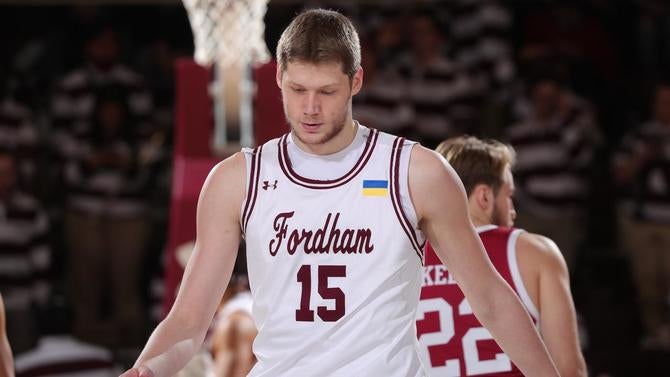
"Ukrainians are fearless," Novitskyi told CBS Sports. "I am proud of the great patriotism being shown by my countrymen in their fight against this tyranny. Now everyone knows that we are one of the toughest nations in the world. We are going to change the world for the better. I am praying for my friends, teammates, and all of Ukraine."
Almost the entire world joins him.
No one knows when or how this conflict is going to end. These are 19-, 20-, 21-year-old men trying to live out a dream of playing basketball and living in the United States. Now, for most, that dream is cloaked in guilt. But amid this, they remain positive. They feel there's no other choice.
"For me, I only want to believe good things," Markovetskyy said.
Believing in good things in the face of a bad reality. That's an unflinching characteristic for the people of Ukraine. So is dignity, and optimism. Qualities that will never be taken from them.
"I just want [this] to finish tomorrow, or today. As soon as possible," Dziuba said as a tremble took over his voice. "People are dying right now."
Half the world away, seven men drift between classes, practices and games as they await on the next update, the next text, the next phone call, hoping they'll continue to come and praying it won't get worse than it already is.


